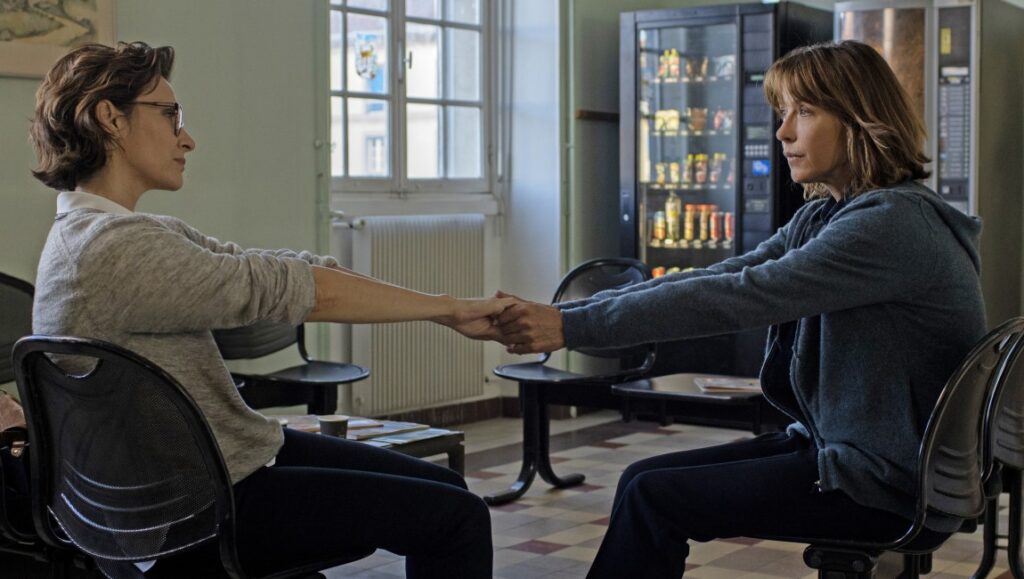André (André Dussollier) has a case of deep vein thrombosis in his right leg, complicated by a pulmonary embolism. He’s also just had a stroke, mouth sagging and eyes perpetually smoldering with brash, cynical conceit. His daughters, Emmanuèle (Sophie Marceau) and Pascale (Géraldine Pailhas), come to visit, overseeing his recovery and assuring him that he’ll be able to walk and move about again. But André, in addition to all these things, wishes to die: he’ll do it with a gun, if that ends up the only option available. He entrusts the search for a peaceful, more hassle-free way of saying goodbye to Emmanuèle, who reacts violently but quickly overcomes her denial for a gradual and muted acceptance. The term “hassle-free,” however, is naturally deeply nebulous. Even as André grumbles and chastises his aides with imperious entitlement, the look in his hardened eyes shapeshifts and softens frequently as the memories of an embittered life flood his mind with nostalgia, regret, and even happiness. For Emmanuèle and Pascale in turn, as with the other figures in his life, the death of a loved one is tragic when present, unsettling when presaged, and troubling when premeditated, especially with them complicit in the process.
Such is the poignant state of affairs in Everything Went Fine, a lean but wryly humane drama on euthanasia and its complications, helmed by veteran filmmaker François Ozon. Unadorned with overt histrionics or ideological moralizing, the film deftly charts the rhythms and dynamics of a family in crisis, modulating the ebbs and flows of emotion in accordance with how much time there is left — for the ailing André, of sound but sad mind, to inch closer to a self-prescribed end; for his daughters and estranged wife Claude (Charlotte Rampling) to intervene in or indulge his decision; for his ex-lover Gerard (Gregory Gadebois) to make amends; and for the necessary details to be ironed out, the wills executed, before the inevitable. Here, Ozon’s wildly vacillating style is tempered to a stark acquiescence, his still frames and economical shots constituting the unsentimental backdrop on which Everything Went Fine presents its fait accompli. “You can’t refuse my father anything,” explains a resigned Emmanuèle, who respects André’s wish even as it dredges up a long-standing resentment for him.
Through sparse and nimbly spaced flashbacks, the film hints at a life before the time of death, when death was already in the picture. André and Claude’s rocky relationship disabused the former of his unconditional affection for Emmanuèle and Pascale, and the disruption to a presumably heteronormative family setup, precipitated by his relationship with Gerard, only served to estrange father from children. As a portrait of domestic disquiet rather than moral outrage, however, Everything Went Fine — adapted from the memoirs of Ozon’s late collaborator, Emmanuèle Bernheim — doesn’t unpack André’s motivations and relationships so much as it maps out their vicissitudes, and they are oft volatile, as one close to death might expect. The eminent art collector thunders against his family’s opposition to assisted suicide, sporting an assurance befitting of a less despairing man. But he also can’t quite make the call and file the papers by himself, and when Gerard accosts him in the hospital or when he soils the bed in the room all alone, his frail and helpless side lends itself greatly to our sympathy.
Curiously, what appears to be Ozon’s least formally ambitious work suits his thematic presentation best. More stoic (in the vein of 2019’s By the Grace of God) than showy (as was 2003’s Swimming Pool), yet inflected with moments of morbid, unintentional levity, Everything Went Fine meaningfully and respectfully explores the touchy issue of euthanasia, or the “right to die,” in lieu of a world where palliative ethics and logistics are being advanced to serve an aging global population. As the days go by and the fateful final drive from Paris to Switzerland (where assisted suicide has been legalized) nears, the film segues into a state of clarity, sharpened by the daily preparations, the necessary tears, and the rehearsed goodbyes. Banking on the off chance that her father might decide otherwise at the last minute, as the Swiss contact (played by Hanna Schygulla) anecdotally suggests, Emmanuèle nonetheless goes through the motions out of forbearance and perhaps filial piety, attempting — and somewhat succeeding — to come to terms with the good father she never had. But it’s hard to accept, much less plan, the passing of a parent; equally punishing is the phone call, hundreds of miles away, informing of the unspeakable and unknowable. Everything went fine: there’s no doubt, even from the get-go, that André’s plan will succeed, but the tranquility of loss doesn’t quite numb the complicated feelings held by those left behind. As Claude presciently informs Emmanuèle, referring to the composition of a canvas, “there are so many colors in gray.”
Published as part of InRO Weekly — Volume 1, Issue 15.


Comments are closed.